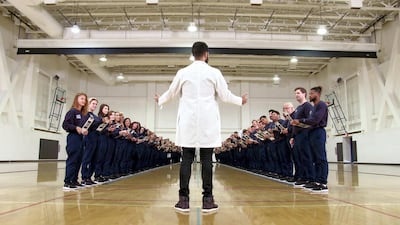On the face of it, 100 Humans probably seems pretty frivolous, but there's much more to Netflix's latest reality show than meets the eye. That is hinted at on its Netflix page, with 100 Humans listed under the science, nature and culture documentary genres.
Its co-host, Alie Ward, says the show is best described as a "social experiment". But while it examines human behaviour in a variety of deeply scientific ways, she says it also happens to be absolutely "bananas".
Unsurprisingly, it starts with 100 people, each of whom were carefully selected to represent different demographics of the US. "This means the show is made up of a really diverse group of people with different backgrounds, perspectives and life stories," says Ward.
But this isn't the sort of reality show in which participants then lean back and wait to fall in love. Instead, they are given a pretty rough ride by Ward and her fellow hosts, comedians Zainab Johnson and Sammy Obeid.
As well as being asked several questions, including how they use the toilet, participants are tested on their memories and whether time flies when they're having fun. The social experiments on 100 Humans go much deeper than that, though, as the show explores whether contestants have inherent sexism or racism they have never confronted.
“It is a really interesting look at human nature and what is behind the surface that we want to present to each other,” says Ward. “We want the world and Americans to look at the United States through the prism of science.”
100 Humans achieves this by making sure that every episode has its own tone and theme, with one focusing on gender, then the next revolving around age and so on. Ward says the series hasn't "been edited and tweaked to show that everything is happy and perfect", which allows it to honestly probe the issues most people often want to shy away from.

But while Ward is keen to point out that not all of the experiments are heavy – she says there are plenty of "lighthearted ones dotted in there, too" – what makes 100 Humans stand out is how it tries to fix the divisive world we live in. Because instead of talking about our differences, 100 Humans uses science to prove how similar and connected we all are.
"Most Americans have a very common goal of just wanting safety, security and to feel provided for," says Ward. "Even though we have these same desires, we are really bifurcated by the media. So everyone involved was excited to show that people are much more similar than we think we are.
"It was really cool to see how it didn't matter if the people in the group had different genders or preferences. Those things didn't separate them. They all found commonalities. We focus so much on what's different with each other, we completely miss the commonalities that are right on the surface."
But while 100 Humans highlights our similarities, there were some particularly harrowing tests, too. For Ward, the most difficult day of filming revolved around an experiment regarding bias and gun violence. Contestants originally believed they were playing a video game designed to time their reactions, but in reality the test showed how each person reacted to people of different races.
"That was such a hard day, because the experiment had so many layers," says Ward. "It was about what it was like to look at violence in America, about how much we are not in control when we think we are and about how we are controlled by the past and by what we see in the media."
What ultimately made that particular test worthwhile was how the participants reacted to this information. Ward says they sought to grow and change because of what they learnt about themselves, a transformation she says she hopes viewers will also undergo while watching 100 Humans.
The obvious power and influence of the show is only one of the reasons Ward is confident Netflix will make a second season. "I think it would be great to do more because there are so many questions that come up after you do it," she says. "I hear that from scientists all the time, because for every question that's answered there are 10 more."
The first season of 100 Humans is available on Netflix now

